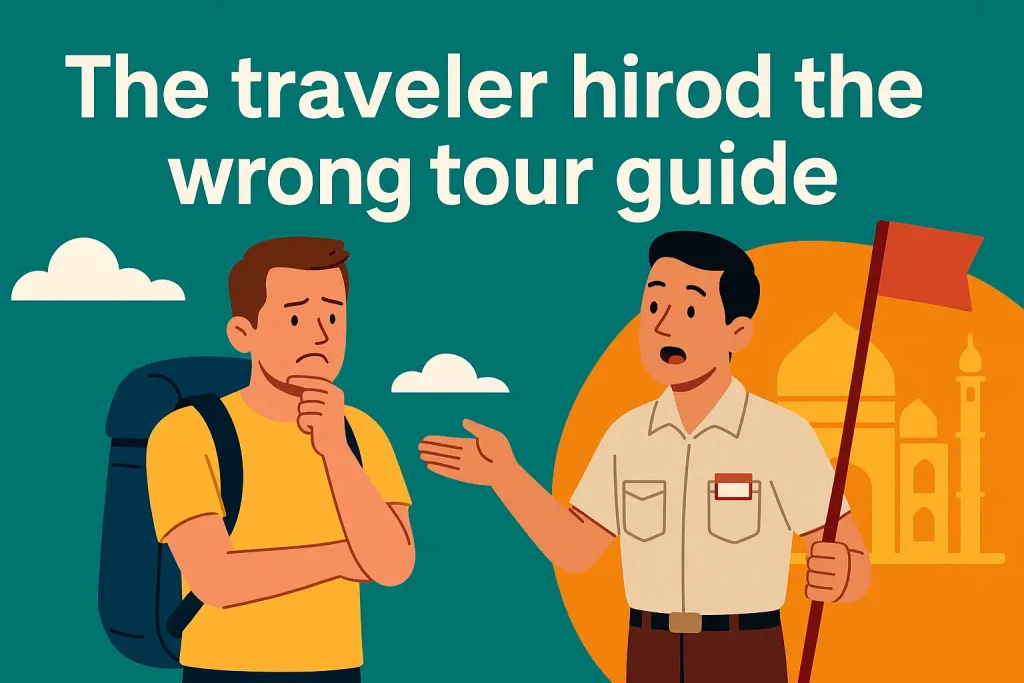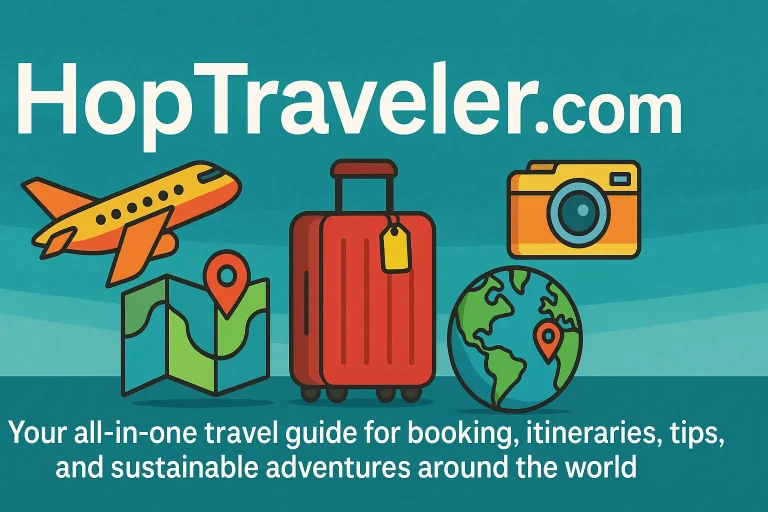
In every great journey, there’s a twist—and sometimes, that twist comes in the form of the traveler hired the wrong tour guide. While travel is about discovery, a misstep like this can shift your adventure into stress, confusion, or even danger. But with the right insights, even a poor experience can become a stepping stone to travel mastery.
What Is “The Traveler Hired the Wrong Tour Guide”?
This phrase echoes a real and frequent travel dilemma—when tourists unknowingly book misleading, fake, or unprofessional guides. It’s not just about inconvenience; it’s about compromised experiences, safety risks, and lost opportunities to connect with the local culture.
Whether through a scammy online listing, a language barrier, or just poor research, travelers can fall into these traps easily. Luckily, with the rise of platforms like TripAdvisor, Lonely Planet, and GetYourGuide, recovery and prevention are more achievable than ever.
The Traveler Hired the Wrong Tour Guide: What Really Happened?
Imagine arriving in a dream destination, excited to explore—but the guide you booked online is nowhere to be found. Or worse, they show up with no knowledge, a chaotic plan, and demand hidden fees. This is not just a story—it happens globally, even in the most popular travel hubs.
Tour guide scams and fake profiles are rising, and with travel planning gone wrong, many lose precious hours of exploration. From misleading travel agencies to poor itinerary planning, the consequences can be frustrating and expensive.
Also Read: https://fizzymag.co.uk/invest1now-com-stocks/
The True Cost of a Bad Tour Guide: Time, Safety, and Money
When you hire the wrong guide, you don’t just lose money—you lose time. Time that could have been spent learning, tasting, and adventuring is wasted on logistical chaos.
Safety becomes a concern too. Unprofessional tour guides might take you to unsafe neighborhoods, ignore regulations, or even mislead you for their own profit. And the financial toll? Hidden fees, overpriced add-ons, or even theft. Travel insurance companies report that such mishaps are among the top claims.
Warning Signs You’re Hiring the Wrong Guide Before It’s Too Late
Spotting red flags early can save your trip. Beware of:
- No website or online reviews
- Requests for full payment in cash upfront
- Refusal to share itinerary details
- Overly aggressive sales tactics
- Vague credentials or zero certification
These signs often point to fake tour guides or scams. Being alert can prevent you from falling into a travel horror story.
Real Stories from Travelers Who Regret Their Tour Guide Choices
Countless travelers have shared their experiences on Reddit, Viator, and Lonely Planet forums. From being left at the border to guides who barely speak the advertised language, the stories are sobering.
One traveler in South America booked through an unverified site and was stranded in the rainforest with no backup. Another in Asia was scammed by a “guide” who led them through gift shops instead of heritage sites. These aren’t just inconveniences—they’re wake-up calls.
Why Research Is Your Best Travel Companion, Not Just a Map
Doing the legwork before booking pays off big time:
- Compare multiple platforms like TripAdvisor, GetYourGuide, and Viator
- Look for verified badges and government-certified guides
- Check travel forums for firsthand experiences
- Use Google Street View to confirm meeting points and guide offices
Planning smartly prevents missteps and boosts confidence while exploring new lands.
How to Verify If a Tour Guide Is Legit or Just a Smooth Talker
Here’s how to verify your guide’s legitimacy:
- Ask for license or certification
- Confirm they are listed with the Department of Tourism
- Review photos, bios, and tour details
- Ask for references or social proof
- Cross-check guide names in travel forums
Reputable guides embrace transparency. If a guide hesitates to answer or provide proof, walk away.
Trust but Verify: Navigating Travel Reviews and Online Listings
Travel review platforms are your first defense, but not all reviews are real. Learn to identify fake reviews (overly generic or all 5-star with no depth).
Seek balanced feedback and multiple source confirmation. Also, look into how recently the reviews were posted. This can reflect current guide performance and professionalism.
Scammed Abroad: When Tour Guides Take You Off the Beaten Path for the Wrong Reasons
Exploring local gems can be thrilling, but some guides use “off-the-path” promises to lure you into tourist traps. Be wary of trips that divert heavily from advertised plans.
Some may lead you to specific vendors where they get kickbacks or create fabricated stops for tips. Authentic adventures shouldn’t come with surprise agendas.
Language Barriers, Fake Credentials, and Tourist Traps: The Risks Are Real
A shared language matters. If communication fails, so does your safety and learning experience. Misunderstandings over fees, directions, or rules can escalate.
Also, beware of guides flaunting fake or foreign credentials. Certified tour guides usually have ID cards or badges issued by local or national tourism departments.
What a Professional Tour Guide Looks Like: Certifications, Behavior, and Reviews
A professional guide is more than a friendly face. They should:
- Have valid certification and ID
- Show knowledge of local history and customs
- Follow safety protocols
- Respect your time and preferences
- Receive consistent positive reviews on TripAdvisor or Viator
Good guides enhance your trip with insight and care. They don’t just show you places—they help you understand them.
Cultural Miscommunication or Just Bad Service? How to Tell the Difference
Not all confusion means poor service. Sometimes cultural differences affect tone, timing, or gestures. But bad service is about intent—neglect, scams, or disorganization.
Understanding the line between the two will help you respond appropriately. Be curious, not confrontational, and always ask questions before assuming the worst.
How to Recover When You’ve Already Hired the Wrong Tour Guide
If you’re stuck with a bad guide:
- Politely exit the tour if unsafe or uncomfortable
- Call your travel insurance provider for support
- Report the incident to your embassy or tourism department
- Leave honest reviews to warn others
Stay calm and redirect your energy to self-guided tours or trusted platforms to salvage the experience.
Refunds, Complaints, and Damage Control: Your Rights as a Tourist
Most countries have consumer protection laws, and many platforms like GetYourGuide offer guarantees. Contact the platform and include screenshots, receipts, and communications.
Also report to the Department of Tourism and your travel insurance company. The World Tourism Organization supports global efforts for tourist safety and recourse.
How to Find a Trusted Local Guide Without Getting Burned Again
Smart strategies to find great guides:
- Ask hotel concierges or local tourism boards
- Use platforms like Lonely Planet, Viator, or GetYourGuide
- Look for word-of-mouth recommendations
- Join local travel groups or forums pre-trip
A trusted guide transforms your trip. Invest in finding the right one.
Tour Operator Vetting Checklist: What Every Traveler Must Know
Always confirm:
- Official website with secure booking
- Certification from Department of Tourism
- Transparent pricing
- Real client testimonials
- Emergency support contact
This checklist helps you choose professionals and avoid pitfalls.
From Horror Story to Life Lesson: Turning a Bad Experience into Smart Travel Habits
Even nightmare tours offer silver linings. They teach you to trust your instincts, research deeply, and prepare better next time.
Treat each misstep as part of your growth as a traveler. Many seasoned explorers have made these mistakes—and now use that wisdom to elevate every future adventure.
Should You Go Solo or Hire a Guide? Pros, Cons, and Considerations
Solo travel offers freedom but lacks insider insight. A guide adds structure, history, and local access. Consider:
- Your travel goals
- Destination safety
- Language comfort
- Personal travel style
Some trips shine solo; others need an expert touch.
The Role of Tourism Boards and How They Can Help You Vet a Guide
Tourism boards are incredible resources. They often list licensed operators, host complaint channels, and offer cultural guidance.
Visit country-specific Department of Tourism websites for reliable leads. These organizations support safe, enriching travel.
Using Tech to Your Advantage: Apps and Websites for Safe Guide Booking
Technology empowers travelers. Use:
- TripAdvisor for reviews
- Viator for vetted tours
- GetYourGuide for real-time bookings
- Google Maps for location confirmation
These tools streamline your planning and reduce risk.
The Ultimate Guide to Choosing the Right Tour Guide for Any Destination
To choose wisely:
- Define what you want from a guide
- Vet across multiple platforms
- Look for certification and strong reviews
- Communicate directly before booking
- Don’t rush. Great guides are worth the wait.
A great tour guide turns a trip into a story worth telling.
FAQs
Q1: How can I check if a tour guide is certified?
Check with the local Department of Tourism or official tour directories. Ask for ID or license upfront.
Q2: What should I do if I realize mid-tour that the guide is a scam?
Exit if safe, report to your booking platform, and inform local authorities. Use travel insurance support.
Q3: Are platforms like TripAdvisor or Viator 100% safe?
They offer protection but not guarantees. Always read reviews and confirm listings.
Q4: Can language barriers really cause serious travel issues?
Yes. Miscommunication can lead to wrong locations, payment disputes, or even legal trouble.
Final Thoughts
Travel teaches us in many ways—sometimes through awe, sometimes through missteps. If you’ve hired the wrong tour guide, you’re not alone. Use the experience to evolve as a smarter, more resilient explorer.
With trusted platforms, guide certifications, and a little preparation, you can ensure your adventures are rich with discovery—not regret.




